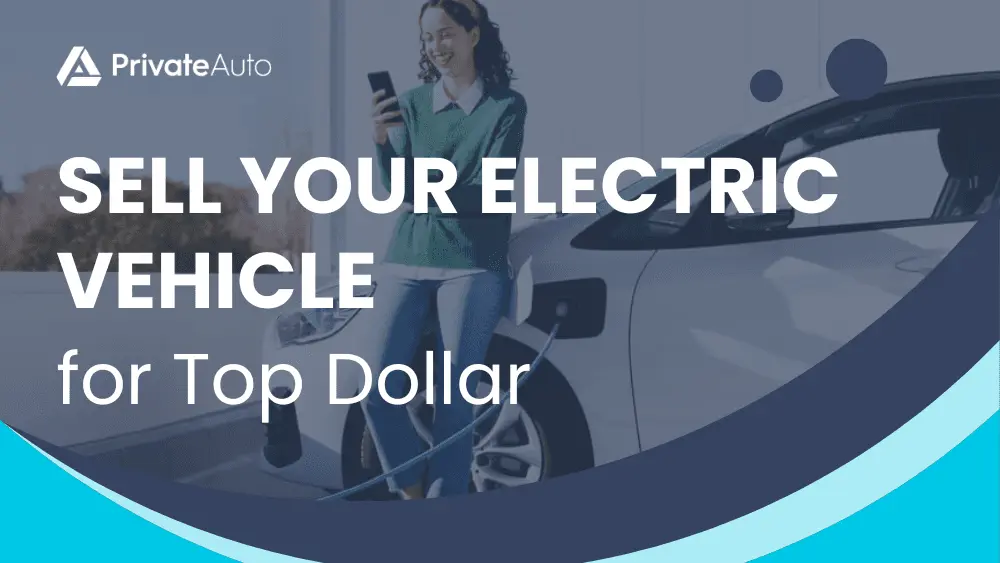Steps for Selling Your Used Electric Car on PrivateAuto

2. Register and get verified
Get started here.
4. Set your terms
6. Choose the perfect buyer
7. Schedule a test drive
8. E-sign documents
9. Get paid, instantaneously
We got tired of the limitations associated with existing payment methods, so we created PrivateAuto Pay. It facilitates instant money transfers up to $1M, fee-free.
10. Transfer title
11. Cancel insurance
12. Take off your license plates
Is There A Market For Used Electric Vehicles?
If you’re looking to sell your electric car, we have good news and bad news: the used EV market is growing, but used EV prices have fallen considerably over the past 12+ months:
- As EVs become more popular, the number of potential buyers expands.
- According to Future Market Insights, the global used EV market is projected to grow from USD 17,890.5 million in 2023 to USD 40,078.9 million by 2033, with a compound annual growth rate (CAGR) of 8.4% from 2023 to 2033.
- Carvana, an online-only retailer that buys and sells cars in the US, has reported a 786% increase in total EV unit sales over the past five years, indicating a growing interest in purchasing used zero-emissions vehicles.
- Prices are dropping for used cars, in particular for EVs. A study by iSeeCars.com found that used EV prices have fallen more than 33% compared to the previous year.
How to Determine the Resale Value of an Electric Car?
Kelley Blue Book and NADA can give you a “fair market value” range for your vehicle based on condition, mileage, make, and model. Within that range, it’s up to you whether to price your EV lower or higher.
Here are some factors to consider when setting a listing price for your electric car:
1. Battery range: a longer range between charges makes your car worth more.
2. Electric car battery longevity: battery health makes your car worth more If the battery’s charge-holding capacity drops significantly, it will reduce the car’s range and suitability for long-distance driving.
3. Depreciation: electric cars depreciate faster than internal combustion engine (ICE) vehicles. For example, three-year-old EVs hold 63% of their value compared to 66% for ICE vehicles, and at five years, EVs hold 37% of their initial value, while ICE vehicles hold 46%.
4. Speed-to-sale: if you want to sell your car fast, ask less for it. If you’re not in a hurry, ask more for it. You can always lower your price if it doesn’t attract buyers.
If you’d like a sense of what your car is worth, use our free car value calculator!
Which Electric Car has the Best Resale Value?
As with other vehicle classes, some EVs hold their value better than others. Here are some of the electric cars that maintain strong resale values in the market:
- Tesla Model 3
- Chevrolet Bolt EUV
- Nissan Leaf
- Hyundai Kona Electric
- Kia Niro EV
- Ford Mustang Mach-E
- Hyundai Ioniq 5 AWD SEL
Where is the Best Place to Sell My Electric Car?
If you want to sell your electric car, you can get way more for it by going directly to a private buyer than you could with a dealer trade-in.
Dealers have to buy low so they can mark your car up and make a profit. When you sell directly to the end user, you capture that extra profit.
PrivateAuto gives you dealer-like convenience in the palm of your hand, so you can sell your EV on your terms.
- Get paid instantly, up to $1M
- Never give out your contact info
- Steer clear of car scams with identity verification
- Act as your own escrow service with our escrow-like safeguard
Even better, you can list your car on other marketplaces. If you find a buyer, you can use DealNow to invite the buyer to a fast-tracked dealflow that gives you all the advantages of our transactional infrastructure.
Create your listing on PrivateAuto now and see how easy selling your EV can be.
How to Sell My Electric Car in Each State?
Different states have different documentation requirements for private-party car sales—for EVs as well as for gasoline-powered vehicles. You have to pay attention to issues such as:
- Whether to leave license plates on the car or remove them
- Whether a bill of sale is required or not
- Whether an inspection is required or not
That’s why we’ve created a guide to selling your car in each state. Click on your state below to learn more.

Where Can I Sell My Car for Cash Today?
Fortunately, PrivateAuto lets you manage multiple listings through the PrivateAuto app. And DealNow lets you get the deal done, even if you listed your car on another site such as Craigslist or eBay Motors.
Start your sale anywhere; finish it and get paid with DealNow.
Simply create a deal room in DealNow, invite your buyer, and enjoy DealNow’s transactional workflow. It give you secure messaging, test drive scheduling, electronic docu-signing, and instant payments.
Want to buy a car instead? Kickstart your buying process now!
Electric Vehicle FAQ
What if my battery warranty hasn't expired before I sell the car?
If your battery warranty hasn’t expired before you sell the car, it can be a significant advantage for the buyer. Battery warranties typically cover the replacement or repair of the battery if it fails during the warranty period.
Who buys an EV?
The market for electric vehicles is diverse, with a wide range of buyers. Here are some key points about who buys electric vehicles:
1. Environmentally conscious consumers
2. Technology enthusiasts
3. Government incentives
4. Fuel savings
5. Urban dwellers
6. Luxury vehicle buyers
Will an EV last 20 years?
Electric cars can last just as long, if not longer, than gas-powered cars with proper care and maintenance.
– EV drivetrains are less complex than gas engines with far fewer moving parts. This allows them to last quite a long time, with some EV batteries warrantied to 180,000– 200,000 miles.
– Most industry experts estimate today’s EVs will reliably operate for 150,000 miles or more as battery technology continues improving over time. High mileage Teslas have exceeded 200,000 and even 300,000 miles driven.
– Battery capacity diminishes slowly with each charge cycle, typically dropping less than 20% after over 100,000 miles if charging habits are well managed. Less range is the primary impact rather than function.
– Other EV components, such as motors and inverters, require little maintenance and hold up well over time. Regenerative braking also reduces wear on braking systems.
– Improvements in battery durability, charging cycles, and materials promise to lengthen EV lifespans further as the technology evolves.
With proactive care, EVs can potentially operate reliably for over a decade if not longer. Advances will continue to extend capabilities and value over their lifetime as well.
How long do EV engines last?
The average lifespan of an electric car motor is estimated to be between 15 and 20 years. EV engines, or motors, are expected to have a long lifespan due to their simpler construction and negligible wear and tear compared to internal combustion engines.
How much does it cost to charge an electric vehicle?
The cost to charge an electric vehicle depends on 2 primary factors:
1. Battery capacity. A larger battery capacity means more required electricity to replenish a full charge. A Ford F-150 Lightning with 98 kWh capacity costs more per full charge than a 75 kWh Tesla Model Y.
2. Electricity rates. Home charging costs are tied to local residential electricity rates, which average $0.13 per kWh nationally. Many utilities offer lower nighttime rates to incentivize off-peak EV charging. Public charging stations charge higher rates.
A full EV charge can range from a couple of bucks to $20 or more. Even on the higher end, electricity remains cheaper than fueling a comparable gas vehicle.
What are some EV future trends?
Here are some trends we can look forward to with electric cars.
1. Mass adoption and market diversity: as costs decrease, EVs are becoming affordable for more consumers globally. EVs could constitute a large portion of new car sales by 2030, potentially surpassing internal combustion engines in some regions. The EV market revenue is projected to reach $623 billion worldwide by 2024, with a steady 9.8% annual growth expected through 2028.
2. Advancements in battery technology: developments in solid-state, silicon anode, and lithium-sulfur batteries aim to improve density, lifespan, sustainability, and charging speed. Battery recycling is also being explored.
3. Greater diversity: the number of EV models available has surpassed 500 in 2022, up from below 450 in 2021, providing more consumer choice. This trend is expected to accelerate.
4. Technological innovations: vehicle-to-grid connectivity, advanced driver assistance systems, innovative motors, and other emerging technologies will make EVs increasingly attractive to consumers.
5. Improving prices: falling battery materials costs could improve EV profit margins and consumer affordability over time.
6. Increasing efficiency and range: over the past decade, average EV efficiency has increased by 15% and the range has doubled. We can expect both efficiency and range to continue to increase.
7. Innovations in charging: future innovations such as wireless charging and ultrafast charging will enhance the EV experience.
Is selling your car online a good idea?
Selling your car online is a good idea. PrivateAuto connects you directly with private buyers while protecting your contact info. We give you a convenient and easy solution for selling your used car and getting top dollar.
Is the electric vehicle market large?
The electric vehicle (EV) market is growing rapidly but still makes up a relatively small portion of overall auto sales. In 2023, EVs represented around 9% of total passenger vehicle sales in the United States.
What are the most popular EV brands?
New EV brands continue to emerge, and traditional car brands continue to enter the EV market. Here are the brands that manufacture electric vehicles.
– Tesla
– Lucid
– Rivian
– Canoo
– Lordstown
– Nikola (heavy-duty EVs)
– Workhorse
– Karma
– Ford
– General Motors
– Hyundai
– Kia
– Volkswagen
– Audi
– Porsche
– Nissan
– BMW
– Mercedes-Benz
Should I offer a vehicle history report when selling an electric car?
While a vehicle history report is not mandatory, it can certainly give potential buyers peace of mind. It covers ownership history and service records and demonstrates how well you’ve cared for your car.
We provide a vehicle history report for all premium listings when you sell your car on PrivateAuto.
Here are some reasons why a vehicle history report is such a good idea:
1. It demonstrates you have nothing to hide. Providing a report shows transparency and proactively addresses any concerns about the vehicle’s history.
2. It builds trust and credibility as a seller. A detailed report proves you’re forthcoming about the car’s background.
3. It verifies maintenance and repairs. A history report lists service records, major repairs, and other work.
4. It can justify your asking price. Documentation of new tires, battery, regular maintenance, etc. helps support pricing.
5. It highlights that the car was well cared for. Regular servicing and repairs indicate responsible ownership.
6. It can ease buyer concerns about accidents or damage. The report documents any collisions or insurance claims.
7. It avoids headaches later if issues arise. A thorough history provides proof if questions arise after purchase.
8. It makes your car stand out. Providing a report shows your willingness to go the extra mile as a seller.

Jacob Andra
Contributing Author
Jacob Andra is an entrepreneur, author, and technology expert living in Salt Lake City, Utah. As a stakeholder in PrivateAuto, Jacob is passionate about how our technology is bringing peer-to-peer car sales into the 21st century. When he’s not working, Jacob can be found playing pickleball, climbing mountains, or spending time with his family.
